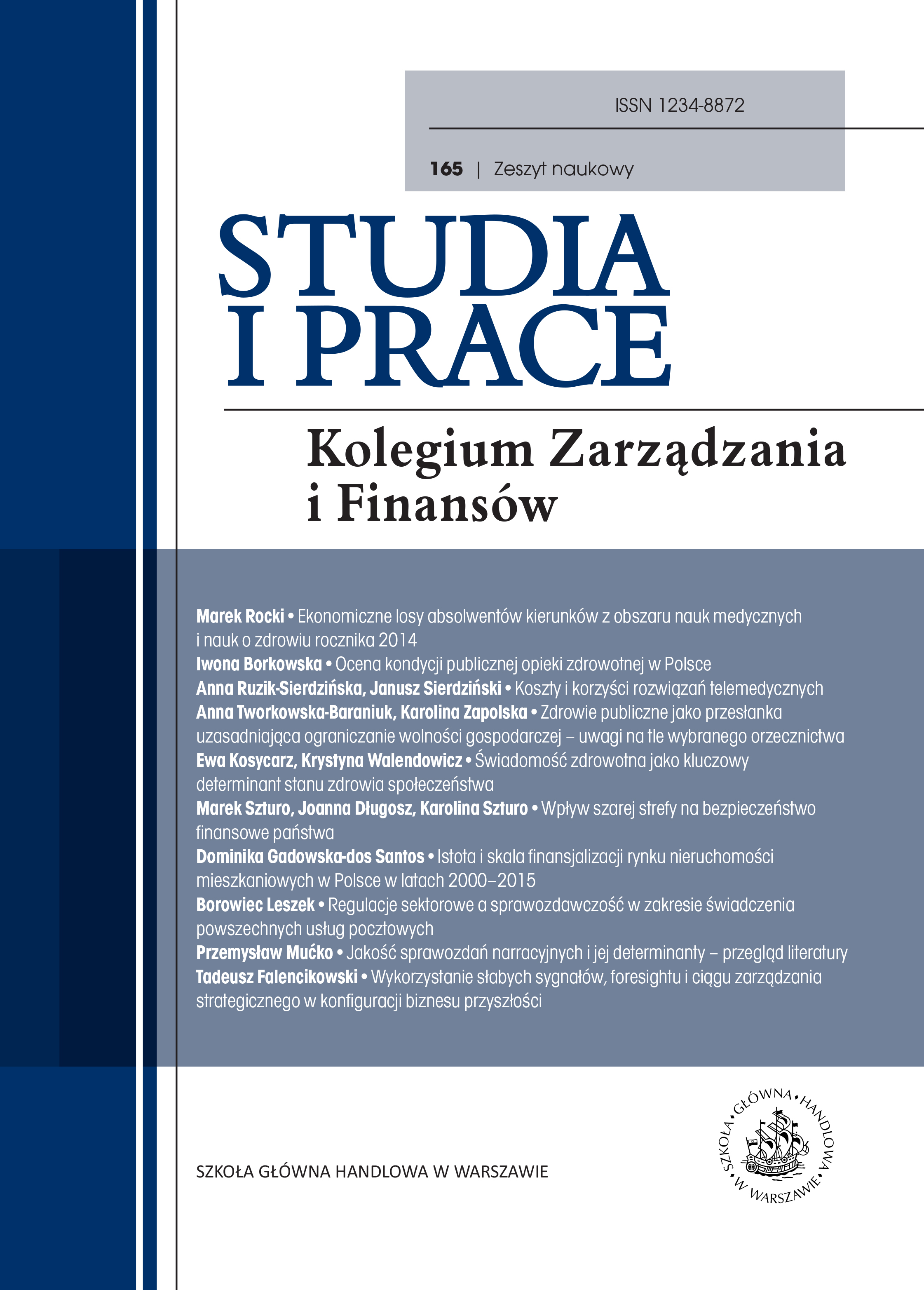Sectoral Regulations and Reporting in Universal Postal Services
DOI:
https://doi.org/10.33119/SIP.2018.165.8Keywords:
market regulation, regulatory accounting, regulatory reporting, universal postal serviceAbstract
or postal services. The author has narrowed research area to universal postal service. Universal services are services which – due to their social importance and because of market failure that may occur in the course of their delivery – should be available in a coherent, continuous and non-discriminatory manner to all social groups and their rendering is regulated by government bodies. Regulations deal, inter alia, with identification of costs of universal services and the need to keep the books in accordance with regulatory accounting principles to correctly estimate and report them.
The paper aims at assessing the impact of sectoral regulations on the value of information provided in reports submitted by the operator entrusted with the rendering of universal postal service. Assessment was made from market regulator’s viewpoint and from the point of view of the consumers of postal services. The paper provides an overview of legal regulations and explains the most specific characteristics of regulatory reporting. Conducted studies suggest that to the market regulator regulatory reporting is an important and major source of information for the evaluation of the efficiency with which universal service is delivered. On the other hand, information value for consumers of postal services seems really doubtful.
Downloads
References
1. Borowiec L., Metoda weryfikacji kosztu netto usług powszechnych jako nieuzasadnionego obciążenia operatora wyznaczonego, Prace Naukowe Uniwersytetu Ekonomicznego we Wrocławiu nr 181 „Rachunkowość a controlling” 2011, red. E. Nowak, M. Nieplowicz.
2. Borowiec L., Szacowanie kosztu netto usługi powszechnej na wybranym przykładzie, Prace Naukowe Uniwersytetu Ekonomicznego we Wrocławiu nr 289, „Systemy rachunku kosztów
i kontroli zarządczej” 2013, red. E. Nowak, M. Nieplowicz.
3. Calzada J., Universal Service Obligations in The Postal Sector: The Relationship Between Quality and Coverage, Original research article, „Information Economics and Policy” 2009, vol. 21,
iss. 1.
4. Eckert S., Postal Reform Around the Globe: Comparing the Asian and European Experience, Original research article, „Policy and Society” 2009, vol. 27, iss. 3.
5. Eckert S., Between Commitment and Control: Varieties of Delegation in the European Postal Sector, „Journal of European Public Policy” 2010, vol. 17, iss. 8.
6. Feijoo C., Milne C., Re-thinking Universal Service Policy for the Digital Era: Setting the Scene – an Introduction to the Special Issue on Universal Service, „Info” 2008, vol. 10, 5/6.
7. Friedman M., Friedman R., Free to Choose: A Personal Statement, Harcourt Brace Jovanovich, New York 1980.
8. Gautier A., Wauthy X., Competitively Neutral Universal Service Obligations, „Core Discussion Paper” 2010, 61.
9. Hoernig S. H., Valletti T. M., The Interplay between Regulation and Competition: The Case of Universal Service Obligations, „IFO – Studien” 2002, 48/1.
10. Iturralde M. J., Quirós C., Analysis of Efficiency of the European Postal Sector, „International Journal of Production Economics” 2008, vol. 114, iss. 1.
11. Jaag Ch., Postal – Sector Policy: From Monopoly to Regulated Competition and Beyond, Original research article, „Utilities Policy” 2014, vol. 31.
12. John R. R., Theodore N., Vail and the Civic Origins of Universal Service, „Business and Economic History” 1999, Winter.
13. Kenny Ch., Reforming the Posts: Abandoning the Monopoly-Supported Postal Universal Service Obligation in Developing Countries, World Bank Policy Research Working Paper 2005, 3627.
14. Papiernik-Wojdera M., Matuszewska-Pierzynka A., Rynek usług pocztowych w Polsce u progu jego pełnej liberalizacji, „Actuaniversitatis Lodziensis, Folia Oeconomica” 2011, 256.
15. Poudou J.‑Ch., Roland M., Equity Justifications for Universal Service Obligations, „International Journal of Industrial Organization” 2017, vol. 52.
16. Raulinajtys-Grzybek M., Rola rachunkowości regulacyjnej w procesie wyceny usług powszechnych w Europie, „Studia Prawno-Ekonomiczne”, t. LXXXVI, Warszawa 2012.
17. Rozbiecki M., Wojciech R., Koszt netto pocztowej usługi powszechnej i jego finansowanie, „Internetowy Kwartalnik Antymonopolowy i Regulacyjny” 2014, nr 2 (3).
18. Sappington D. E. M., Regulation, Economic Theory of International Encyclopedia of the Social & Behavioral Sciences, 2 ed., 2015.
19. Simon J. P., Universal Service: Between Socio-political Mythology and Economic Reality – an International Cross Comparison EU-USA of the Regulatory-Economic Framework, „Info” 2008,
vol. 10, 5/6.
20. Stolarczyk A., Przegląd zmian w polskim Prawie pocztowym – pakiet regulacyjny 2012/2013, „Internetowy Kwartalnik Antymonopolowy i Regulacyjny” 2014, nr 2 (3).
21. Tochkov K., The Efficiency of Postal Services in the Age of Market Liberalization and the Internet: Evidence from Central and Eastern Europe, Original research article, „Utilities Policy”
2015, vol. 36.
Akty prawne
1. Dyrektywa 97/67/WE Parlamentu Europejskiego i Rady z dnia 15 grudnia 1997 r. w sprawie wspólnych zasad rozwoju rynku wewnętrznego usług pocztowych Wspólnoty oraz poprawy
jakości usług (zwana I Dyrektywą pocztową).
2. Dyrektywa Parlamentu Europejskiego i Rady 2008/6/WE z dnia 20 lutego 2008 r. (zwana III Dyrektywą pocztową).
3. Rozporządzenie Ministra Administracji i Cyfryzacji z dnia 6 maja 2013 r. w sprawie prowadzenia przez operatora wyznaczonego do świadczenia usług powszechnych rachunkowości
regulacyjnej i kalkulacji kosztów usług powszechnych (Dz.U. z 2013 r., poz. 542).
4. Sprawozdanie z rachunkowości regulacyjnej Poczty Polskiej za rok 2016, www.uke.gov.pl
5. Ustawa o rachunkowości z dnia 29 września 1994 r. (Dz.U. z 2002 r. nr 76, poz. 694 z późn. zm.).
6. Ustawa z dnia 23 listopada 2012 r. Prawo pocztowe (Dz.U. z 2012 r., poz. 1529).









